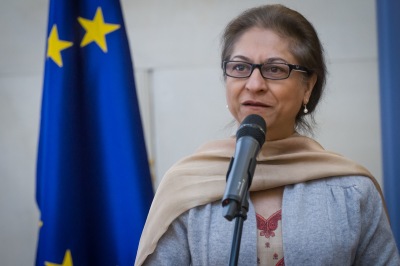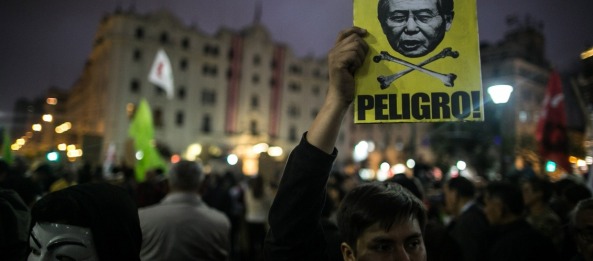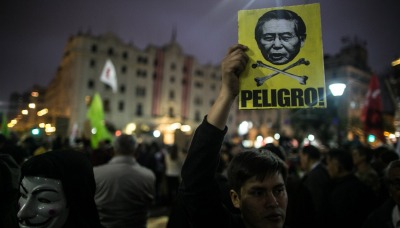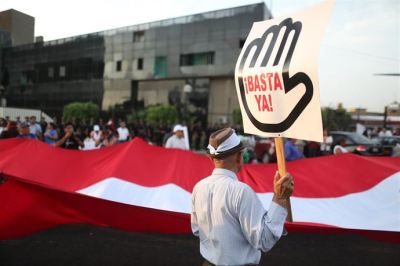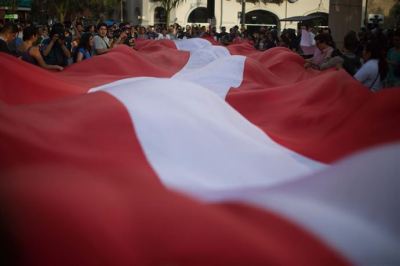Asma Jilani Jahangir born 27 January 1952 in Lahore – died 11 February 2018 in Lahore) was a Pakistani human rights lawyer and social activist who co-founded and chaired the Human Rights Commission of Pakistan. She is widely known for playing a prominent role in the Lawyers’ Movement and serves as the trustee at the International Crisis Group. Born and raised in Lahore, Jahangir studied at the Convent of Jesus and Mary before receiving her B.A from Kinnaird and LLB from the Punjab University in 1978. In 1980, Jahangir was called to the Lahore High Court and to the Supreme Court in 1982. In the 1980s, Jahangir became an democracy activist and was imprisoned in 1983 for participating in the Movement for the Restoration of Democracy against the military regime of Zia-ul-Haq. In 1986, she moved to Geneva, and became the vice-chair of the Defence for Children International and remained until 1988 when she moved back to Pakistan.
In 1987 she co-founded the Human Rights Commission of Pakistan and became its Secretary General until 1993 when she was elevated as commission’s chairperson. She was again put under house arrest in November 2007 after the imposition of emergency. After serving as one of the leaders of the Lawyers’ Movement, she became Pakistan’s first woman to serve as the President of Supreme Court Bar Association of Pakistan. She has co-chaired South Asia Forum for Human Rights and was the vice president of International Federation for Human Rights.
Jahangir served as the United Nations Special Rapporteur on Freedom of Religion from August 2004 to July 2010, including serving on the U.N. panel for inquiry into Sri Lankan human rights violations and on a fact-finding mission on Israeli settlements. Jahangir is the recipient of several awards including the 2014 Right Livelihood Award (along with Edward Snowden), 2010 Freedom Award, Hilal-i-Imtiaz in 2010, Sitara-i-Imtiaz, Ramon Magsaysay Award, 1995 Martin Ennals Award for Human Rights Defenders, and the UNESCO/Bilbao Prize for the Promotion of a Culture of Human Rights. She was awarded an Officier de la Légion d’honneur by France. Her prominent writings include The Hudood Ordinance: A Divine Sanction? and Children of a Lesser God. She passed away on February 11, 2018.
Life and History
Jahangir was born into a prosperous and politically active family with a history of activism and human rights work. Her father, Malik Ghulam Jilani, was a civil servant who entered politics upon retirement and spent years both in jail and under house arrest for opposing military dictatorships. Her father was imprisoned on several occasions for his outspoken views, which included denouncing the Pakistani government for genocide during their military action in what is now Bangladesh (formerly East Pakistan). Her mother, educated at a co-ed college at a time when few Muslim women even received higher education, also fought the traditional system, pioneering her own clothing business when the family’s lands were confiscated in 1967 as a result of her husband’s opinions and detention.
Jahangir herself became involved at a young age in protests against the military regime as well as opposing her father’s detention by then president, Benazir Bhutto’s father, Zulfikar Ali Bhutto in 1972. She received her B.A. from Kinnaird College, Lahore and her law degree in 1978, and her Bachelor of Laws (LLB) degree from Punjab University. She also holds an honorary doctorate from University of St. Gallen in Switzerland., Queens University, Canada, Simon Fraser University, Canada and Cornell University, United States. She is married and has a son and two daughters, Munizae Jahangir, a journalist and Sulema Jahangir, who is also a lawyer.
Author
In addition to many publications, Jahangir has authored two books: Divine Sanction? The Hudood Ordinance (1988, 2003) and Children of a Lesser God: Child Prisoners of Pakistan (1992). One of her major publications is titled “Whither are We!” and was published in Dawn, on 2 October 2000.
Death
Asma Jahangir suffered a cardiac arrest in Lahore on 11 February 2018 and died when was taken to the hospital. 11 february 2018

